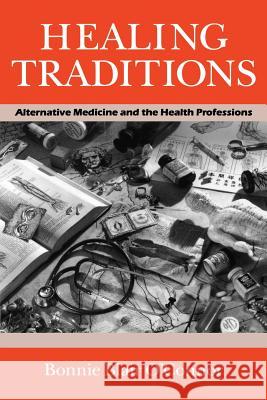Healing Traditions: Alternative Medicine and the Health Professions » książka
Healing Traditions: Alternative Medicine and the Health Professions
ISBN-13: 9780812213980 / Angielski / Miękka / 1994 / 288 str.
"This fascinating book does much to explain why so many people seek help from alternative therapies like acupuncture or herbalism, traditional Chinese medicine or other non-Western therapies."--Boston Globe "This book presents a very strong argument that medical clinicians must become more aware of their 'medicocentric' bias and learn to accord patients more authority in decisions affecting their treatment."--Journal of the American Medical Association "Healing Traditions persuasively argues for culture and belief as organizing principles in the choices patients make about whom to see and what to use in seeking relief for suffering...O'Connor offers both a breadth of material and at least the start of an approach worth considering...Healing Traditions has an important message about honoring our patients' worlds."--Annals of Internal Medicine "Well-written, timely, careful. . . . O'Connor's book is excellent reading and provides a thorough discussion of the meaning of the cultural embeddedness of health care beliefs and behaviors using the United States as an exemplar."--Medical Anthropology Quarterly "Although O'Connor's approach is that of ethnographer rather than historian, her densely packed and imaginatively written presentation illuminates an important historical motif, the 'colonialism' (p. 178) of scientific medicine."--Bulletin of the History of Medicine The popularity and practice of alternative medicine continues to expand at astonishing rates. In Healing Traditions, Bonnie Blair O'Connor considers the conflicts that arise between the values and assumptions of Western, scientific medicine and those of unconventional health systems. Providing in-depth examples of the importance and benefits of alternative health practices--including the extraordinarily extensive and sophisticated HIV/AIDS alternative therapies movement--O'Connor identifies ways to integrate alternative strategies with orthodox medical treatments in order to ensure the best possible care for patients. In spite of the long-standing prediction that, as science and medicine progressed--and education became more generally available--unconventional systems would die out, they have persisted with undiminished vitality. They have, in fact, experienced a reinvigoration and expansion during the last fifteen to twenty years. In the United States, this renewal is fueled by people representing a wide cross-section of American society, and most of them also use conventional medicine. This eclecticism can result in conflicts between the values and assumptions of Western, scientific medicine and those of unconventional health systems. O'Connor demonstrates the importance of understanding how various belief systems interact and how this interaction affects health care. She argues that through neutral observation and thorough description of health belief systems it is possible to gain an understanding of those systems, to identify likely points of conflict among systems--especially conflicts that may occur in conventional care settings--and to intervene in ways that ensure the best possible care for patients. Bonnie Blair O'Connor is a folklorist and ethnographer who specializes in the study of health belief systems. She is Assistant Professor of Community and Preventive Medicine at the Medical College of Pennsylvania in Philadelphia and Lecturer in the Department of Folklore and Folklife at the University of Pennsylvania.
"This fascinating book does much to explain why so many people seek help from alternative therapies like acupuncture or herbalism, traditional Chinese medicine or other non-Western therapies."--Boston Globe"This book presents a very strong argument that medical clinicians must become more aware of their 'medicocentric' bias and learn to accord patients more authority in decisions affecting their treatment."--Journal of the American Medical Association"Healing Traditions persuasively argues for culture and belief as organizing principles in the choices patients make about whom to see and what to use in seeking relief for suffering…O'Connor offers both a breadth of material and at least the start of an approach worth considering…Healing Traditions has an important message about honoring our patients' worlds."--Annals of Internal Medicine"Well-written, timely, careful. . . . O'Connor's book is excellent reading and provides a thorough discussion of the meaning of the cultural embeddedness of health care beliefs and behaviors using the United States as an exemplar."--Medical Anthropology Quarterly"Although O'Connor's approach is that of ethnographer rather than historian, her densely packed and imaginatively written presentation illuminates an important historical motif, the 'colonialism' (p. 178) of scientific medicine."--Bulletin of the History of MedicineThe popularity and practice of alternative medicine continues to expand at astonishing rates. In Healing Traditions, Bonnie Blair O'Connor considers the conflicts that arise between the values and assumptions of Western, scientific medicine and those of unconventional health systems. Providing in-depth examples of the importance and benefits of alternative health practices--including the extraordinarily extensive and sophisticated HIV/AIDS alternative therapies movement--O'Connor identifies ways to integrate alternative strategies with orthodox medical treatments in order to ensure the best possible care for patients.In spite of the long-standing prediction that, as science and medicine progressed--and education became more generally available--unconventional systems would die out, they have persisted with undiminished vitality. They have, in fact, experienced a reinvigoration and expansion during the last fifteen to twenty years. In the United States, this renewal is fueled by people representing a wide cross-section of American society, and most of them also use conventional medicine. This eclecticism can result in conflicts between the values and assumptions of Western, scientific medicine and those of unconventional health systems.O'Connor demonstrates the importance of understanding how various belief systems interact and how this interaction affects health care. She argues that through neutral observation and thorough description of health belief systems it is possible to gain an understanding of those systems, to identify likely points of conflict among systems--especially conflicts that may occur in conventional care settings--and to intervene in ways that ensure the best possible care for patients.Bonnie Blair O'Connor is a folklorist and ethnographer who specializes in the study of health belief systems. She is Assistant Professor of Community and Preventive Medicine at the Medical College of Pennsylvania in Philadelphia and Lecturer in the Department of Folklore and Folklife at the University of Pennsylvania.











